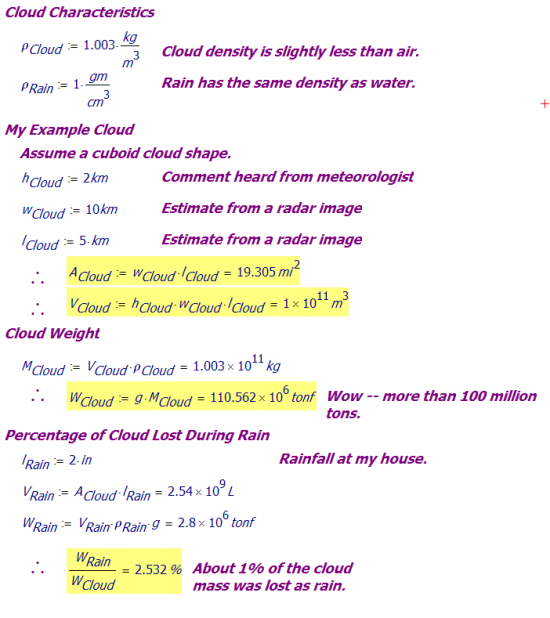Introduction
We have had a lot of rain in Minnesota this summer. As I sit here staring at the rain falling hard outside, I occurs to me that a cloud must be a very heavy thing in order to drop this much rain. It seems to me that figuring out the weight of a rain cloud would be a good Fermi problem. This cloud also dropped quite a bit of rain – how much of the cloud mass was lost as rain? Let's dig in …
Background
I need to round up some facts about clouds.
- Clouds float for the same reason a balloon floats – cloud material weighs less than air.
- The density of air at a typical altitude and temperature is about 1.007 kg/m3.
This is an interesting number. Air is heavier than I thought. Think about it – a cubic meter of air weighs 1.0 kg, which is 2.2 lbs. For some reason that seems like a lot to me. - The density of cloud droplets is about 1.003 kg/m3.
Given these typical characteristics, lets try a specific example.
A Cloud Example
The cloud that hangs over my home can be modeled as a cuboid.
- The cloud height (top to bottom) is 2 km (hCloud= 2 km)
- The cloud length is 10 km (lCloud= 10 km)
- The cloud width is 5 km (wCloud= 5 km)
- This cloud dropped 2 inches of rain (lRain= 2 inches)
Analysis
A quick bit of Mathcad work gives me my estimate for cloud weight and the percentage of weight that rain represents.
Conclusion
I would have never guessed that a cloud weighed that much. I also am surprised that a major rainfall represents such a small portion of the weight.


You calculated a much larger cloud than I did - I used a teeny little cotton-puff of a cloud to do my math on 🙂
I like your blog! I especially like your empirical approach to measuring the cloud. You sound like me. You encounter a lot of neat things in your reading and you want to share it. You now have a new blog follower.
mathscinotes
Well, I neither have nor know how to use MathCAD - it's a skill I never had to develop. I was particularly proud of my astrolabe, however 🙂
I'm glad I found somebody else who likes to calculate random things just for the fun of it. Now to read more of your calculations!
Astrolabe? Cool! Could you post a photo? I just ordered a book with plans for some primitive navigation gear and I would like to build a project from the book.
As far as Mathcad goes, I am on a mission. I am a HUGE fan of computer algebra systems. I have found them very useful in my work and I use them for my recreational math as well. I use Mathcad as my main vehicle because it is the simplest to train people on.
Ha, my "astrolabe" was pretty primitive, and I included a photo of it in the post. Basically a protractor with a weighted string clamped to it.
Because I don't use MathCAD for work and I'm not a student... too bad they don't have a "just playing with it" license with a price somebody who really is just playing with it could rationalize.
CC. There is free stripped down version of mathcad, which should allow you to do many common algebraic calculations. There are actually two versions of full mathcad. The main one now is called mathcad prime. The traditional version is no longer being enhanced but you get a copy with prime, to stop old users complaining. The free version I believe is a stripped down version of prime without more advanced features. You may be able to get an old copy (non prime version) on ebay. I upgraded my older version that way not too long ago.
Tim Hughes